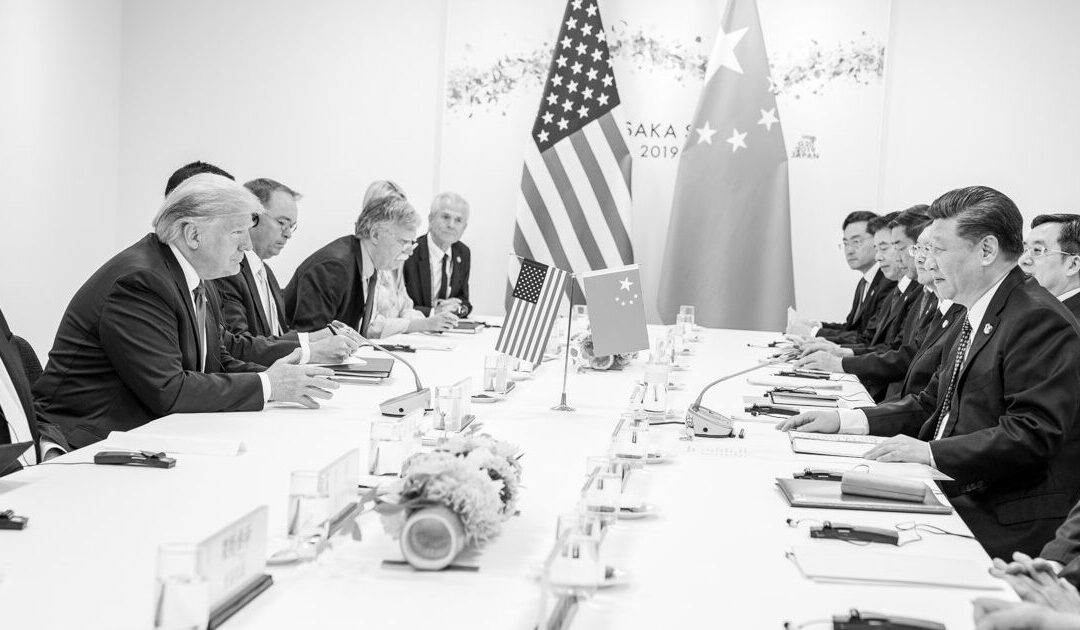Trump’s China Trade War: Good for the U.S. and Allies
November 1, 2024

Trump was right on China in 2016, and he’s right in 2024. The U.S. needs to economically decouple and stop funding the military it’s most likely to face in a future conflict.
During his 2016 campaign, President Trump promised a tough stance on China. Democrats and mainstream media criticized his approach, claiming his trade restrictions and tariffs triggered a “destructive” and “failed” trade war.
Now, as the 2024 election approaches, Trump pledges an even tougher approach to China, with 100% tariffs. Critics are reviving old arguments, suggesting that it would be better for the U.S. to elect Kamala Harris and foster closer economic ties with China.
However, these arguments were flawed in 2016 and are even weaker now. The Biden-Harris administration not only upheld Trump’s tariffs but also strengthened them and imposed additional restrictions on China’s access to technology, especially chips. At the very least, these arguments appear hypocritical.
Trump’s trade war with China is critical for national security, the economy, and accelerating decoupling from China for the U.S. and its allies.
As exporting from China to the U.S. becomes more costly, American and European manufacturers will be compelled to either move production to the U.S. or relocate to other countries, such as Vietnam, Thailand, India, and Indonesia.
Factories moving to the U.S. bring investment, create jobs, and generate tax revenue, as their profits are earned domestically rather than in China.
Manufacturers that relocate to U.S. allies strengthen those economies, reducing their dependence on China and aligning them more closely with U.S. political interests.
Vietnam, Thailand, India, and Indonesia are pivotal to U.S. strategy in Asia, and increased trade will bolster these critical alliances.
China is the number one national security threat to the U.S., making it senseless for the U.S. to allow China to profit from American trade and investment.
Critics argue that Trump’s trade war with China failed for several reasons, with tariffs increasing costs for American consumers and raising prices on many products.
However, this is the purpose of tariffs: they are intended to discourage people from purchasing those products. If Americans choose to buy the products anyway, it generates revenue for the government.
When Trump raised billions of dollars in tariffs, this meant billions in revenue for the U.S. Treasury.
Since Americans typically avoid paying high prices, tariffs create an opening for American and foreign manufacturers to meet demand with more affordable products—diverting money away from Beijing.
Naysayers also argue that the U.S. trade deficit with China didn’t decrease despite the tariffs. The simple answer is that tariffs need to be increased even further.
Instead of fixating on the trade deficit, critics should focus on total revenue earned by Beijing—this is the figure the trade war was intended to reduce.
Trump has proposed a possible 200% tariff; if you own a small business and triple your prices, it stands to reason that demand for your products and services would drop significantly.
Critics also point out that China’s retaliatory tariffs hurt American farmers reliant on exports, leading the U.S. government to issue costly relief packages. This is a valid concern—U.S. exports to China will inevitably decline due to retaliatory tariffs.
However, during World War II, U.S. exporters couldn’t sell to Nazi Germany once the U.S. entered the war. The situation with China is similar; the U.S. and China are already in a cold war, and trading with an adversary should be limited.
During the Cold War with the USSR, trade and investment between the two were minimal. It’s unclear why critics expect the China cold war to be treated differently.
Critics argue that China continued its trade cheating, including intellectual property theft and forced technology transfer, with minimal structural reform.
This is similar to the criticism that, despite Trump negotiating a Phase One trade deal, China didn’t fulfill its commitments, leading critics to label Trump’s trade policies as ineffective.
However, these points logically suggest the need for stricter restrictions.
Both critics and conservatives agree that China engages in unfair trade practices and that existing measures have not been enough to curb this behavior.
Therefore, it makes sense to stop trading with China altogether. This also underscores the ineffectiveness of the WTO and other globalist organizations, bolstering Trump’s argument for withdrawing from the agreement.
Critics also claim that the trade war disrupted global supply chains, driving up production costs and limiting growth opportunities for U.S. businesses.
However, this disruption occurred largely because U.S. allies, like Germany and France, undermined the trade war by continuing to trade with and depend on China.
Stronger restrictions and a Trump-style diplomatic push, reminding allies of their reliance on the U.S. for security and trade, would encourage them to seek new supply chains and trade routes that exclude China.
Finally, critics claim that Trump worsened U.S.-China relations. However, under Biden, China remains the number one cybersecurity threat, top trade violator, leading espionage threat, and primary military rival.
This suggests that a softer approach has not improved relations and indicates that the U.S. should not seek closer ties with China. Instead, the U.S. should strengthen alliances, shifting trade and investment away from China, and restrict immigration from the PRC to reduce espionage opportunities.
Trump was right about China in 2016, and the past four years of unchecked Chinese aggression prove that tougher measures are necessary.
The post Trump’s China Trade War: Good for the U.S. and Allies appeared first on The Gateway Pundit.
Go to Source
Author: Antonio Graceffo

